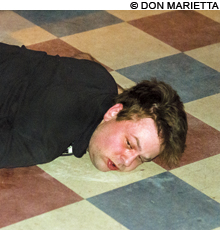
FEELIN' THAT WAY After Cuss's High Gravity hits you, look out.
|
The majority of people who listen to Cuss will invariably remember one thing. Men are pigs.In the abstract, they're right, of course. But everyone knows there's more to it than that. On High Gravity, the singular Portland rock band take up the uneasy task of unpacking that claim like so many packages of processed sausage links. Their eight-song album is a visceral, largely disgusting document, often of questionable digestibility. Yet it's also a remarkable, strangely compelling piece of work. And like hungry bros in a breakfast line, many adventurous rock fans might inevitably find themselves craving it.
With guitar, bass, drums, and vocals, Cuss doesn't have any formal tricks up its sleeve, yet no one would fail to identify their most active, distinctive force. The group's core is the churning, grinding, tightly coiled rhythm section of bassist Sean Ferrante and drummer Elijah True, and the various ways singer Alex Merrill can think to deploy it for his immodest and tortured ministrations. The meaty, 6/8 measures of opener "One Off" feel like the noise of a perilous factory, in which a stuck Merrill, easily one of Portland's most physical and theatrical singers, emits actual squeals amid various missives of agony. "Bad Idea Beer" is a seasick waltz over which we're treated to the thought process of a discharged laborer during a particularly afflicted evening. And though they smooth out the madness of "Vampire, Cancer" — and I can't even tell you what time signature that's in — it's Merrill again who compels our attention, matching the intensity of the final refrain at every measure.
No slight to the guitar, but it's clearly a second fiddle on High Gravity. The band was formed as a guitarless three-piece — even playing as a duo for a while — before landing former Whip Hands guitarist Thom Cote for this recording. He's already left the band (and the country), but his input aids several tracks here, particularly in "Kid Poet," a slowly mutating ballad in 11/8 that achieves moments of climactic trebly beauty before ceding to Merrill's throaty dismissals.
Though music like this is uncommon these days, it's not without its history. A generation removed from June of '44, (early) Shellac, and the mathy obsessions of the indie-rock '90s, you might consider Cuss to be bastard antecedents of a uniquely interesting — if a little male-dominated — period of Midwestern underground rock. Architectural, laborious, repetitious, and chaotic, this style failed to catapult even its most tireless groups to prolonged success, which is one of the reasons why it's captivating to see those same qualities revived in this band today. It makes them more interesting and deserving of trust. Call it stylistically passé, but nobody's making music like this in Maine — at least not this good. Seen another way, there's an equally valid argument that this sort of music is so poached in its era that it's become impossible to evolve, and so musicians have left it for dead.